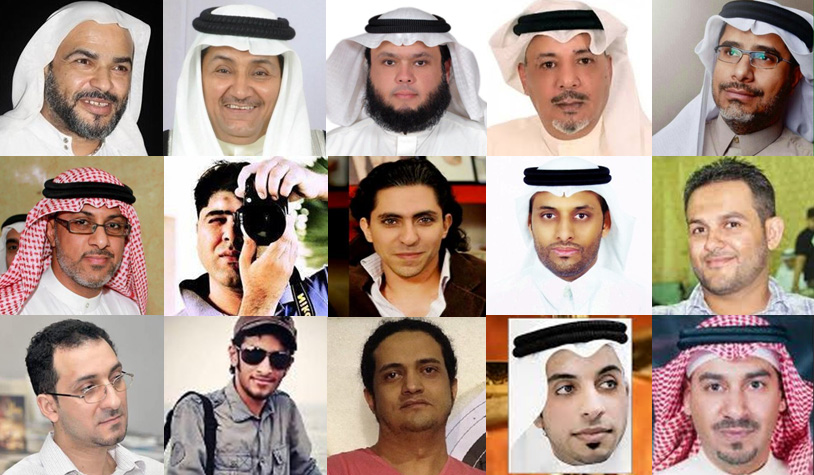
While the world celebrates The World Press Freedom Day in the 3rd of May every year, Saudi Arabia continues practicing various types of oppression against press and journalists by preventing all forms of free opinion expression, in addition to pursuing, arresting, and prosecuting its practitioners.
UN has chosen the title: Visionary Minds in Critical Times: The media’s role in building and enhancing peaceful, equitable, and inclusive societies for all; a slogan for The World Press Freedom Day for 2017.
Saudi writers, journalists, and bloggers are behind the bars for expressing their opinions which are classified by Saudi Arabia as a crime. Earlier in the year of 2017, the Saudi court sentenced the writer Nadir Al-Majed to seven years in prison for his writings in which he demanded for rights; while the journalist Alaa Burnji serves seven years in prison on charges of Twitter tweets and other charges related to expressing his opinion. Also, the photographer Jassem Mekki Al Safar serves a seven-year prison term for charges including raising pictures, and meeting foreign journalists.
Saudi’s government went beyond prosecuting and detaining, as in February 2014 it killed the photographer Hussein Al-Faraj while filming the government’s infringement in breaking houses. Also, in February 2012 it killed the photographer Zoheir Al-Saeed while filming a demonstration in Al-Awamiya city. Furthermore,it sentenced poet Ashraf Fayyad to death for his poems before it commute the sentence to eight years in prison, in a sentence that is not finally resolved yet. While the blogger Raef Badawi sentenced to a thousand lashes and to ten years in prison.
Moreover, the poet and writer Adel Al-Labbad sentenced to thirteen years in prison for some of his poems in which he denounced the murder of protesters, and for his writings in which he claimed for rights and freedoms.
In addition, Saudi Arabia detained the writer Trad Al-Omr since November 2016 for articles demanding reform; the writer Zoheir Kotobi also was sentenced to four years in prison for his calls for reform during a television interview. Furthermore, the media personnel Sheikh Wajdi Al-Gazawi was sentenced to twelve years in prison for his media participation in which he criticized corruption and demanded for changes. Also, the writer Mohammad Kowaildi, the media personnel Sheikh Jalal Al Jamal, the media personnel Ali Jaseb Al-Tahifa, the writer Zakariya Safwan and others are behind the bars.
This reality, in addition to banning free media, and constraining on all social media, reflects the press freedom level in Saudi Arabia. In its annual report, Reporters Without Borders Organisation considered that the situation in Saudi Arabia is very dangerous and in a constant decline, where Saudi Arabia ranked 168, declining three points from last year. The organisation puts The King of Saudi Arabia Salman Ben Abd Al-Aziz on its list of press freedom hunters.
Freedom House Organisation pointed out in its report that Saudi Arabia is not a free country, and does not have a freedom of information law that allows the public access to it. It also does not reveal sensitive topics, including government spending and the granting of ruling family members.
Besides, the European Saudi Organisation for Human Rights confirms that the reality in Saudi Arabia is heading towards more blackness regarding press freedom, while politicians promote for changes on various levels in the country through 2030 Vision.
Yet, the country’s free press has not received any kind of attention even on propaganda level.
The organisation points out that while the world celebrates The World Press Day and highlighting the media role in building and protecting the society, journalists, bloggers, and writers in Saudi Arabia face harsh penalties for expressing their opinions.
